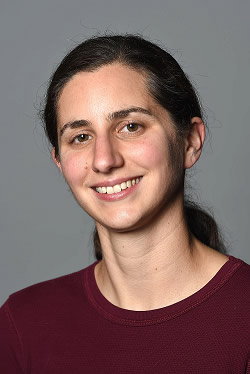By Ana Rita Neves
 Dr. Megan Mayerle graduated magna cum laude from Marquette University with a Bachelor of Science degree majoring in both Biology and English Literature. She pursued graduate studies at Johns Hopkins University with former RNA Society President, Dr. Sarah Woodson, researching ribosome assembly in bacteria. Dr. Mayerle then completed a Postdoctoral Fellowship in the laboratory of Dr. Christine Guthrie at University of California, San Francisco and is now a Grant Writer and Project Coordinator at the Stanford Cardiovascular Institute.
Dr. Megan Mayerle graduated magna cum laude from Marquette University with a Bachelor of Science degree majoring in both Biology and English Literature. She pursued graduate studies at Johns Hopkins University with former RNA Society President, Dr. Sarah Woodson, researching ribosome assembly in bacteria. Dr. Mayerle then completed a Postdoctoral Fellowship in the laboratory of Dr. Christine Guthrie at University of California, San Francisco and is now a Grant Writer and Project Coordinator at the Stanford Cardiovascular Institute.
Dr. Mayerle first joined RNA Society in 2009 and continues to be inspired by the depth of thought, openness, and enthusiasm from many in the RNA community. It is perhaps unsurprising that her favorite aspect of the RNA Society is the “ability to interact with such an amazingly open, interesting, insightful, and helpful group of scientists.” She commented that another strength of the RNA community is its diversity, which she hopes will continue to increase in the future. She cautioned that inclusion does not, however, happen by itself and that “universities and the scientific community must take active measures to increase diversity.” As a testament to her own commitment to this issue, Dr. Mayerle served (at UCSF) on mentoring and outreach committees that prioritized the recruitment and retention of women in science.
As a post-doctoral fellow, Dr. Mayerle investigated how fidelity is achieved during pre-mRNA splicing. “Splicing must be performed with extraordinarily high fidelity,” she said, “but the process must also be flexible enough to allow for alternative splicing.” How the spliceosome is able to relax its fidelity to select less optimal splice sites and how the cell regulates this process were the primary focus of her research. While these are vast and complex scientific questions, Dr. Mayerle thinks that recent high-resolution structures of the spliceosome will likely “provide unprecedented insight into how it functions as a molecular machine, and particularly how conformational changes contribute to fidelity.”
About a year ago, Dr. Mayerle began to apply for faculty positions, and although she received a number of offers, none were in locations that also provided acceptable employment opportunities for her spouse. Dr. Mayerle noted, “many universities have very progressive spousal hiring policies, but are often unprepared for situations where the spouse is not an academic.” She then decided to put her faculty plans on hold and took a systematic approach to finding a non-faculty job, by focusing on the aspects of faculty positions she had found so appealing. “I was initially worried that I would not be able to find a non-faculty position with everything I wanted,” she explained, “but talking to a wide range of friends and colleagues helped to remove that worry.”
“Figure out what your strengths are and what you need in your work to be happy”
In her new position, Dr. Mayerle uses many of the skills she gained during her training. In addition to writing and administering center and research grants, she is involved in teaching and curriculum development, helps trainees analyze their data, and provides support in the preparation of abstracts, papers, and oral presentations. She commented that “this position is an excellent fit for me, as it requires the mixture of independence, intellectual engagement, student mentoring, and analytical thought that I aimed for.”
Her advice to trainees exploring careers outside of the faculty path? “There are a lot of cool jobs out there,” she said, “figure out what your strengths are and what you need in your work to be happy, then talk to as many people as you possibly can about their careers to help identify those positions that are best suited for you.” Moreover, “take full advantage of institutional resources and your network of supportive friends and mentors.” And, she concluded, “start as early as you can.”
Dr. Mayerle’s favorite RNA is 16S rRNA. To connect with Megan and gain get more insight into her science and career, visit her on twitter as @MeganMayerle.
